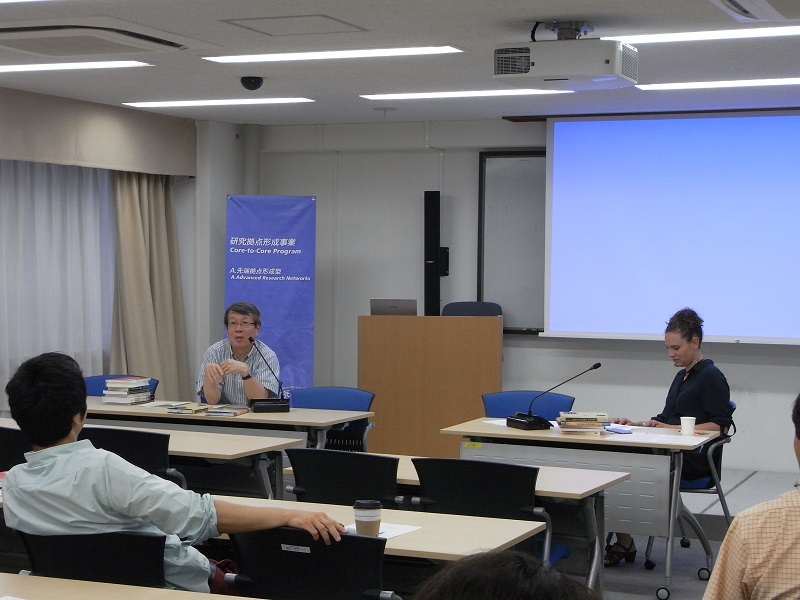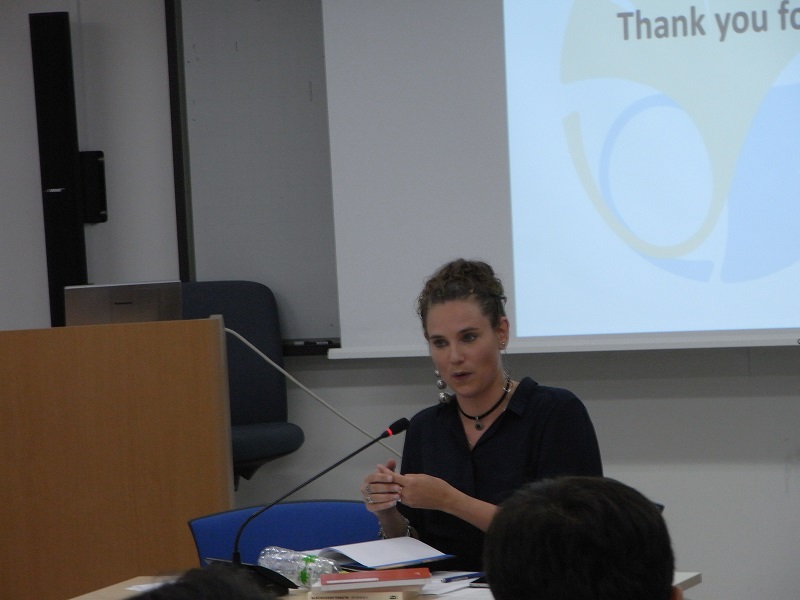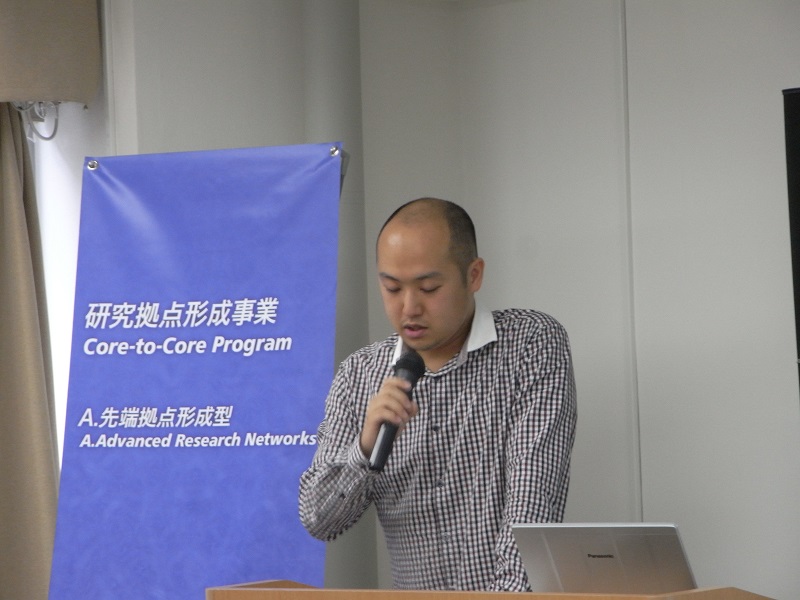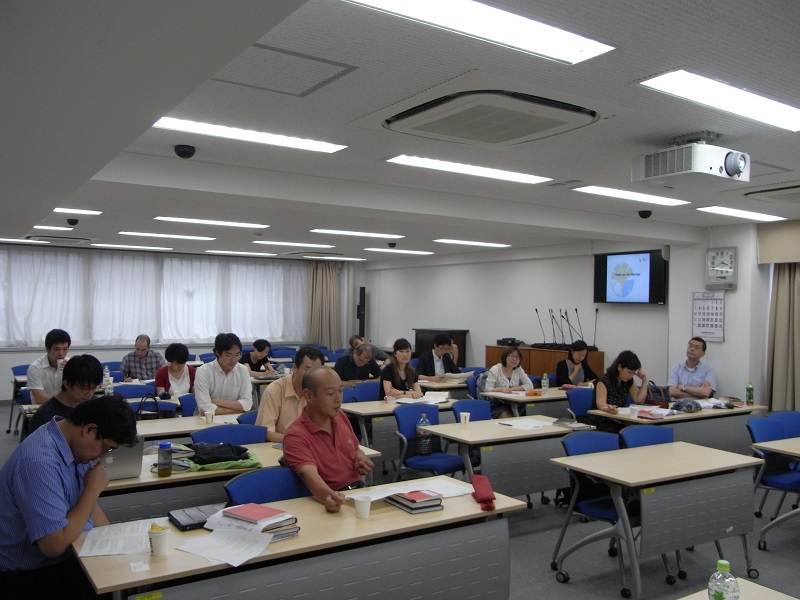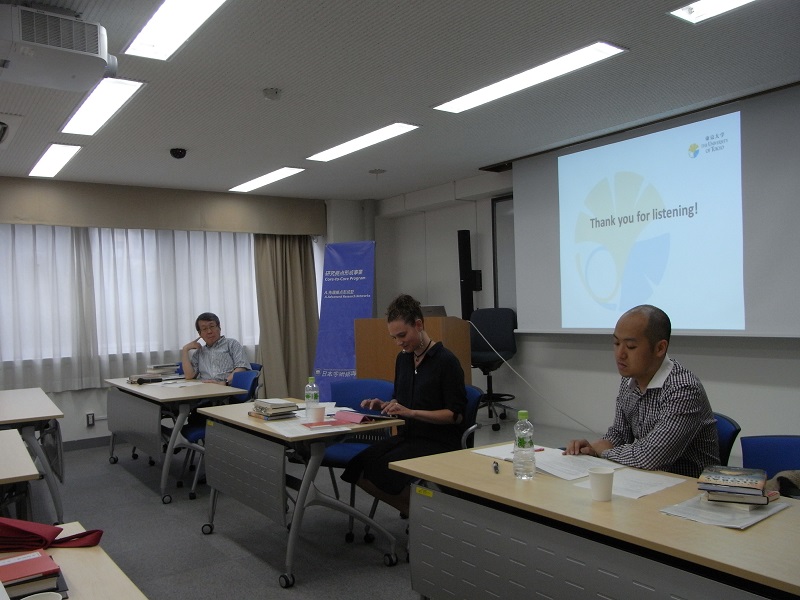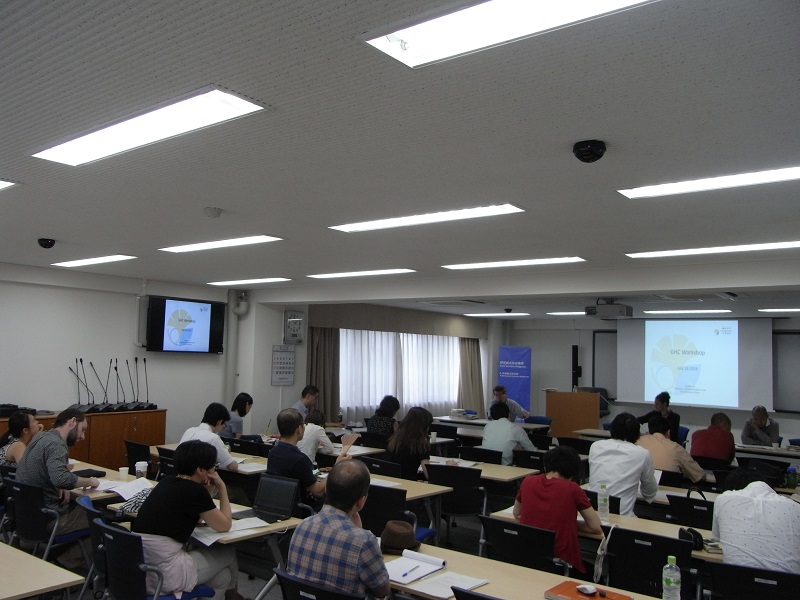2016.07.26
GHCワークショップ「グローバルヒストリーの方法」 GHC Workshop "Methods for Global History"
2016年7月16日(土)、GHCワークショップ「グローバルヒストリーの方法」が、東京大学東洋文化研究所で開催された。2人の若手研究者が今年刊行されたグローバルヒストリーに関連する2冊の英文書籍を比較しながら書評し、それを出発点に参加者が広くグローバルヒストリーの意義や方法について意見と情報を交換した。
コンラドのいうglobal integrationの意味と方法としての有効性、グローバルヒストリーと「地域」の経験の両立性、global historyとworld historyの研究対象や方法の違い、現代における歴史研究の意味と枠組みなど多くの論点について、外国人研究者も交えた二十数名の参加者によって、5時間近く、日本語、英語を交えた熱く刺激的な議論が行なわれた。
以下に当日報告を担当したLisa Hellman(日本学術振興会外国人特別研究員)、上村剛(東京大学大学院法学政治学研究科博士課程)両氏による報告概要を掲載する。
Lisa Hellman
On Saturday 16, a GHC seminar compared two recent books on global history: The Prospect of Global History, edited by James Belich et. al., and published by Oxford University Press in 2016 as well as What is global history?, written by Sebastian Conrad and published in 2016 by Princeton University Press. The Prospect of Global History has three introductory essays, including one by Jürgen Osterhammel. In this, he underlines how much global history can benefit from using theories developed by historical sociologists. In the seminar, the potential theoretical inspiration that lies in other fields such as historical geography and feminist geography was also mentioned. The essays in the edited volume range across a wide number of topics, but do not quite manage to clearly tie themselves together, or to strictly follow the suggestions for global history, definitions of crucial concepts, given in its own introductory texts. For example, several of the essays show signs of having been influenced by imperial history, but did not clearly distinguish between that and the global approach argued for in the introductions. Conrad’s book What is global history? reads as a handbook for researchers and students, and has a very solid historiographical section detailing how global history has sprung up in the intersection of several fields. What is global history? is based partly on Conrad’s book Globalgeschichte from 2013. In rewriting that volume, Conrad has expanded the text on the challenges that global history confronts, such as the need to engage itself not only with mobility, but also frictions of mobility, just as with inequalities and power relations. However, power relations are still not given a prominent position. Additionally, while Conrad argues that global history would benefit from a social historical turn, which might put historical mobility into proper relation to historical immobility, he could have provided more examples of such studies to inspire prospective global historians. The same goes for his treatment of global historical studies with a gender perspective. Finally, both Osterhammel's essay and Conrad’s book, stress two crucial matters for future studies in global history: one is to define that connections not only existed, but that they had an impact relevant to the study at hand, and second, to engage with causality – global historians, they argue, cannot content themselves with describing history, we must endeavour to explain it.
上村剛
Beyond Connectivity? : Theorization of Global History
1. 政治思想史とグローバル・ヒストリー (the History of Political Thought and Global History)
2.書評対象について
2-a. James Belich, John Darwin, Margret Frenz, Chris Wickham (eds.), The Prospect of Global History, Oxford UP, 2016 (以下P)
・2012年9月にOxfordで行われたconference “New Directions in Global History”が基になっている(P, Acknowledgements)。1. Conceptual considerations 2. Global circulations 3. Global networks の3部構成。方法の問題について取り扱うのは1のintro, ch.1-2。
2-b. Sebastian Conrad, What is Global History?, Princeton UP, 2016(以下W)
Globalgeschichte (C.H. Beck, 2013)の改訂、大幅な書き替え。
本書では、まずthree varieties of global historyが示される(the history of everything/ the focus on exchange and connections/ global integration)。これら3つのglobal historyの種類が示されたあと、global history史が簡便に述べられ(Ch.2)、その後、global historyのcompeting approaches ――comparative history, transnational history, world-systems theory, postcolonial studies, multiple modernities ――が批判的に検討される(Ch. 3)。そこから、Conrad自身が主張する第3の“global integration” approachがなぜ第2のconnection approachに優るかが述べられ(Ch. 4)、その後integrationの内実が検討される(Ch. 5)。そして、彼の理論によればspace (Ch. 6)、time (Ch. 7)、positionality (Ch. 8)がどのように定位されるかが述べられたあと、global historianが歴史を書く際に生じ得るproblems――ideology, hierarchies of knowledge, geopolitics and languageなど――について慎重な留保が付く(Ch. 9, 10)。
・3つの特徴
1.“the history of everything”(W, p.6)ではなく、“Global history as a distinct approach”を主張
2.approach, perspective (≠object)としてのGlobal history (W, p.90)
3.approachであることの帰結として、Global historyは “constructivist endeavor”(W, p. 185)として理解され[i] 、constructする歴史解釈主体そのもののattitudeが問いとして浮上する。Ch.10 ”Global history for whom?” はこの点でunique
3.“Connectedness” (P, p.14) and “Beyond connectivity”(W, p.72)
・2冊の書物の最大の差異 … connectedness/connectivityに対する評価
3-a. Connectednessに対するPの評価…おおむね好意的
connectednessとはなにか?人のmobilityと、それを支えるnetworksの存在
3-b. これに対してWではconnectionを超える方法が模索される
Global integration
○Global historyをdistinct approachによって積極的に理論化するべきか否か?するべきであるとして、global integrationとcausalityに重点を置くConradの理論化は肯定されるべきか否か?
4.Global history and imperial history
面白いことに、このようなConradの態度は、imperial historyと近接してくる。(cf. W, pp.103-104[ii], 108[iii]) global integrationについて叙述しようとするとき、imperial historyは(ある種の)語りやすさを持つから。 ConradはPの編者のひとりJohn Darwinの “Empire has been the default mode of political organization throughout most of history.”(W, p.193)[iv] という一文を引く。
○だが、imperial historyに近いかたちで理論化することは、同時に幾つかの難題をふくむのではないか。
- 分析枠組みとしての“empire”という用語の妥当性? (cf. W. pp,194-195)
- Conrad流のglobal historyの理論的限定は、ともすればimperial historyの文脈に回収される可能性もあり、両者の関係そのものが問い直されざるを得ないのではないか。
○global historyの「理論化」の問題点?
----------------------------------
[i] もっともこれは、Conradにuniqueなものではない。既存の境界を越えて歴史を再構築しようとする歴史家は、必然的にessentialismを否定せざるを得ないであろう。この点Osterhammelは“the fruiltless dichotomy between essentialism and constructivism”を否定しつつも、“We are all constructivists now.” と述べる。(P, p.37)
[ii] Conradはfive modes of integrationとして、“technology, empire, economy, culture, and biology”の5つをあげる。
[iii] “For many global historians, the infrastructure provided by the British Empire and the trade routes in the early modern Indian Ocean are key to explanations of global change.”
[iv] 元の文章は、John Darwin, After Tamerlane, Penguin Books, 2007, p.23
The GHC Workshop on “Methods for Global History” was held on Saturday, July 16, 2016, at the Institute for Advanced Studies on Asia, the University of Tokyo. Two junior researchers, Lisa HELLMAN and KAMIMURA Tsuyoshi, touched off the discussion with their comparison and critique of two English-language works published earlier this year—The Prospect of Global History, edited by James Belich et. al. (Oxford University Press, 2016) and Sebastian Conrad’s What is Global History? (Princeton University Press, 2016)—prompting a wide-ranging exchange of views and information by the participants regarding the significance and methods of global history.
For almost five hours, animated and stimulating discussion in both Japanese and English took place among the nearly twenty participating researchers, including several foreign scholars, covering a large number of issues, such as the implications of Dr. Conrad’s concept of “global integration” and its efficacy as a method, the compatibility of global history with “regional” experiences, differences between the research objects and methods of “global history” versus “world history,” and the significance and frameworks of contemporary historical research.









